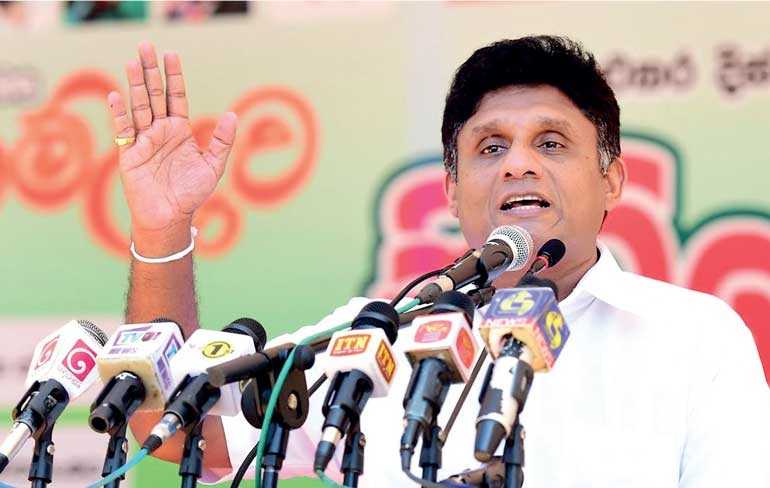Thursday Feb 26, 2026
Thursday Feb 26, 2026
Thursday, 18 July 2019 00:42 - - {{hitsCtrl.values.hits}}

Sajith Premadasa
Expectations, father and son
Sajith Premadasa has put his hands up for leadership in the party and for nomination by the United National Party in the forthcoming presidential elections. I wish Sajith had tested himself, and had given the public a chance to test, his distinctive capabilities and resourcefulness as a leader in governance.
He has, indeed, proved to be an effective speaker resonating his illustrious dad. But that is just one qualifying factor. In the complex and most challenging situation the island now confronts, very much more is expected of a leadership aspirant. The biological fact of being the son of the father is hardly relevant to the Lankan public’s political perceptions today. Neighbouring India has unequivocally rejected this ‘right of inheritance’ notion. 
Senior Premadasa
At the end of the day, one has to lean on the cliché that the proof of the pudding is in the eating. Ranasinghe Premadasa demonstrated his effectiveness in many ways before he was able to pierce through a party that was then known to be feudalistic. That was the senior Premadasa’s great moment. He was Colombo City Councillor, Colombo’s Mayor, the Minister in charge of Local Government and Housing and Prime Minister. Ranasinghe Premadasa accomplished himself well and truly and created a strong impression of efficiency, response to challenges, discipline and hard work.
While on his political journey up, senior Premadasa showed another good quality, namely, loyalty to his party and party leader. He once said that one has to learn to be a follower before becoming a leader. That was what Ranasinghe Premadasa had been.
To most of us who had the fortune to be in some proximity to Ranasinghe Premadasa, we witnessed a man with enormous drive, self-confidence, and ambition to reach the top. His peer recognition was unambiguous except for the ‘elite leaders,’ like Lalith Athulathmudali, who always seemed to me to be sceptical and even scornful of Premadasa. It was this drive that built Premadasa’s resilience and his determination to overcome all obstacles.
Weakness of the inheritance factor
President Ranasinghe Premadasa was killed even before the LTTE bomb and that was when accusations went viral that he was behind the killing of prominent persons. I, frankly, do not know the sources of these rumours and how they ignited a fire of public disgust that eventually made thousands of persons cheer and light crackers when the leader was bombed to death. There was something not quite right. Fact or fiction, the position is that the man was publicly condemned.
A significant lesson for Sajith here is that in the course of election rhetoric the opposing candidate can caricature and fictionalise the murder allegations. This sullies Sajith’s reliance on the ‘right’ of inheritance.
Taking challenges
Sajith never showed, then and now, the same positive drive and ticker toward leadership of the Grand Old Party. He seems to me as having been more reliant on the legacy factor. He happily took the subject of Housing and moved to the periphery of the island to work quietly.
The key insight required of a leader in governance is a practical understanding of economic and social policy. The Housing portfolio constitutes charity work. In terms of opportunity cost, the cost of diverting public funds to housing like this is considerable. This is not to deny that there is no need for special housing projects for really vulnerable families, disabled persons, etc. That is a State charity that must be done; yet it is charity, and the mind of the relevant minister doesn’t have to operate in challenging labyrinths and pathways
What are the challenges and perennial obstacles that surface in housing? Marginal. The minister depends on national budgetary allocations and spends the money he has got by giving a contractor to do the job. It is a question of taking from the national purse and distributing among selectees. Something extra Sajith could have done is to undertake a housing census to identify the more deserving of public charity like this. Here, the Minister has faulted. The public are not aware of the criteria for selection. It seems to be ad hoc and piecemeal. Another area that cries for attention, but is hard for the mind, are the changes required to the legal framework in housing. Current laws inhibit private sector housing investment.
Sajith, once, did challenge Ranil Wickremesinghe for leadership of the party. But, here too, he had nothing to show other than being the son of the father. His father virtually demonstrated his ability in taking challenges and then put up his hands up.
Validity of the Housing Project
Sajith Premadasa’s belief that he can solve the housing problem this way, by diverting the poor resources of the National Treasury, are easily subject to challenge by economists. It is bad economic policy to begin with. The Minister will not make even a dent on the national housing problem this way. No country in the world has solved housing needs this way. The real path is to boost per capita income, and secure a legal and financial environment where banks can engage in safe and swift mortgage transactions with customers for mutual benefit. An economy ridden with poverty cannot fix housing shortages. Sajith Premadasa’s talk of promising houses and bits of land to all and sundry is, therefore, nonsense and deceitful.
Economic growth is crucial. This needs an overhaul of the economy in many structural ways, to encourage exports and Foreign Direct Investment and to develop entrepreneurship. To be fair, the current Government is on this line of attack and I wish Sajith had joined one of these Government endeavours and worked in a big way. In Australia, the Treasurer’s job (Finance Ministry) is deemed next in line to premiership. That experience is so challenging and self-learning very much suited to the goal of apprenticing for leadership.
The key insight required of a leader in governance is a practical understanding of economic and social policy. The Housing portfolio constitutes charity work. In terms of opportunity cost, the cost of diverting public funds to housing like this is considerable. This is not to deny that there is no need for special housing projects for really vulnerable families, disabled persons, etc. That is a State charity that must be done; yet it is charity, and the mind of the relevant minister doesn’t have to operate in challenging labyrinths and pathways.
(The writer can be reached via [email protected].)